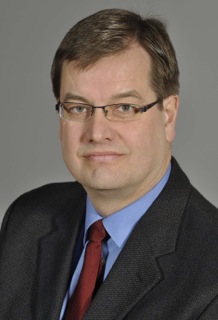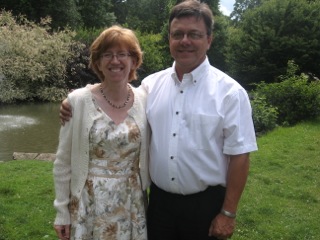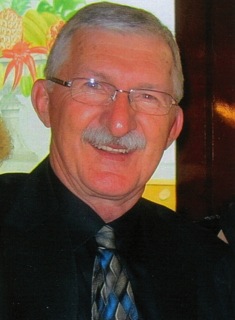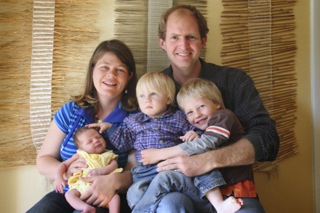Community & Alumni Blog

CMU recognizes distinguished alumni with 2013 Blazer Awards
A public policy expert, a man working at building relationships between First Nations people and Mennonites, two international development workers living in West Africa, and a pastor who writes a blog of worship resources are the recipients of the 2013 Blazer Distinguished Alumni Awards.
CMU President Cheryl Pauls will present the awards at the university’s Fall Festival tomorrow evening—Friday, Sept. 27. The goal of the award is to celebrate alumni who, through their lives, embody CMU’s values and mission of “service, leadership, and reconciliation in church and society.”
The awards are presented annually to people who have studied at CMU or one of its predecessor colleges—Canadian Mennonite Bible College (CMBC) and Mennonite Brethren Bible College (MBBC)/Concord.
The following people will be presented with awards for 2013:

John Siebert
John Siebert has worked on public policy issues in one way or another for the past 30 years. Before graduating from the University of Winnipeg with a degree in political science, he attended MBBC from 1977 to 1979—an experience he says was deeply formative.
“[Attending MBBC] put the whole area of politics and public policy into a Mennonite/Anabaptist framework, asking very basic questions about what is our duty to the state, what is our duty to the church, and to our commitment to Jesus Christ,” Siebert says.
Siebert was a Foreign Service Officer with the Department of External Affairs, Program Officer for Human Rights and Aboriginal Justice with the United Church of Canada, and at other times has been a consultant to governments and non-governmental organizations in Canada and overseas in project and program development, institutional evaluation, and policy development.
He is currently the executive director at Project Ploughshares, a Waterloo, Ont.-based non-governmental organization that works with churches, governments, and civil society, in Canada and abroad, to advance policies and actions to prevent war and armed violence and build peace.
The work he does at Ploughshares dovetails nicely with his curiosity about politics, public policy, and the role that churches can play in creating both a better Canada and a better world.
“I don’t ever want to whitewash what Canada is about, but as a country, its ability to both restrain evil and advance good is probably one of the better models in the world—certainly much better than some of the alternatives,” says Siebert, who has two adult children with his wife, Carolyn Wiens.
“I think we as Christians have an obligation to contribute what we know [and] what we understand about how life can be advanced, particularly for those who are most vulnerable.”

Carol Penner
With a PhD in Systematic Theology, Carol Penner has taught courses at Conrad Grebel University College. Pastoral ministry is her true passion, though.
She is currently wrapping up nine years as pastor at The First Mennonite Church in Vineland, Ont. In January, she will start working as the pastor at Lendrum Mennonite Brethren Church in Edmonton, Alta.
Penner is also a freelance writer who, for the past five years, has maintained a blog of worship resources at www.leadinginworship.com. Her work grows from her daily walk with people inside and beyond her congregation.
“You hear stories or you pray with people, so [written] prayers come out of that,” says Penner, who graduated from CMBC in 1981. “I think about my congregation and what they need to hear. The worship resources flow out of being a pastor and being in tune with congregational life.”
Instead of letting these resources sit in a file in her office, Penner wants other people to be able to use them. She receives anywhere from 400 to 500 hits on an average day, with visitors from all over the world.
The blog’s tagline is “Worship resources in a Mennonite voice for ears of all kinds,” and indeed, worship leaders from a variety of denominations use Penner’s work.
“Not many people write me, but when they do write a comment or respond to my email address, then I find out it’s a Presbyterian church in Scotland, or a Baptist church in Louisiana,” she says. “It’s cool to think that my prayer is being used somewhere else.”
In addition to worship, Penner believes that life is about service. Last year, she donated one of her kidneys to a stranger. She felt called to donate her kidney after watching the process that her husband, Eugene, went through when he was diagnosed with kidney cancer in 2008 and had his diseased kidney removed.
“We’re here to serve God, and being able to donate an organ is just another part of service.”

Leonard Doell
Born the third of 13 children, Leonard Doell grew up in Warman, Sask. on Treaty Six territory, the traditional home of the Nehiyawak or Plains Cree people. Through Treaty Six, the Young Chippewayan Band was granted 30 square miles of excellent farmland in 1876.
The next year, the Federal Government took the land from the Young Chippewayan to make it available for white settlement, which included Mennonites. The Young Chippewayan were never compensated.
Doell, who today works as the Aboriginal Neighbours Coordinator at Mennonite Central Committee (MCC) Saskatchewan, is passionate about building relationships between First Nations people and Mennonites, and helping Mennonites in the area understand what happened with Treaty Six. Through his work, Doell builds relationships, organizes events, and leads learning tours.
“Part of the thing we’re trying to recognize is our responsibility as God’s people to uphold the covenant that was made between First Nations and non-aboriginal people, including Mennonites, on the signing of Treaty Six,” says Doell, who attended CMBC from 1975-1976.
“[Christians are] God’s ambassadors of peace and reconciliation here on Earth. This is one opportunity we have to make a difference. We can’t solve all the land claims across the country, but we have one in our backyard that we can work toward resolution for.”
Doell has worked as a farm labourer, construction worker, truck driver, and school bus driver, and he has served as a volunteer in a variety of capacities through MCC, Mennonite Disaster Service, and Mennonite Church Canada.
Throughout it all, Doell—who is married to Tina and has three adult children and four granddaughters—has had a strong interest in historical research and writing.
“There are a lot of stories out there where Mennonite history and First Nations history meet,” he says. “There are stories where we have connected well with each other, and others where we haven’t connected quite as well. We want to be learning from both.”

Robin and Zachary Heppner Entz
For the past six years, CMU graduates Robin and Zachary Heppner Entz have worked for World Renew, an organization that serves worldwide as the development, disaster response, and justice arm of the Christian Reformed Church in North America.
Living in the West African nation of Mali, the Heppner Entzs work as community development consultants advocating on behalf of the Fulani communities as they seek to retain ownership of their communal lands.
The Heppner Entzs’ advocacy work has led them to communicate with various levels of Malian government, and they facilitated communication between the communities and the American-funded Millennium Challenge Account (MCA) project as they resettled and equipped 33 Fulani communities as rice farmers.
“What I love about our particular position with World Renew is that we get to do direct community work, and have the opportunity to live in the village and build authentic relationships with the people in Mali that we work with,” Robin says.
For Zachary, Mali feels like home. His parents were missionaries for 30 years and he grew up in West Africa.
“I’ve lived around poverty my whole life and feel [working in Mali] is one thing that I can do to help people who are in poverty,” he says.
The Heppner Entzs are currently on sabbatical in Canada with their three children, Elijah, Isaac, and Naimah. They are looking forward to returning to Mali in late December for another two-year term.
Zachary and Robin appreciated their time at CMU.
“One of the messages I got from CMU is to not only preach [the gospel], but live it out as well,” Zachary says. “Doing development work is doing that. It’s doing something about the poverty you see around you and bringing social justice to the contexts you live in—not only for yourself, but for the people around you, too.”
The awards ceremony honouring these men and women takes place at 7:00 PM on Friday, Sept. 27 in CMU’s Laudamus Auditorium. All are welcome to attend. Admission is free.


 Print This Blog Post
Print This Blog Post